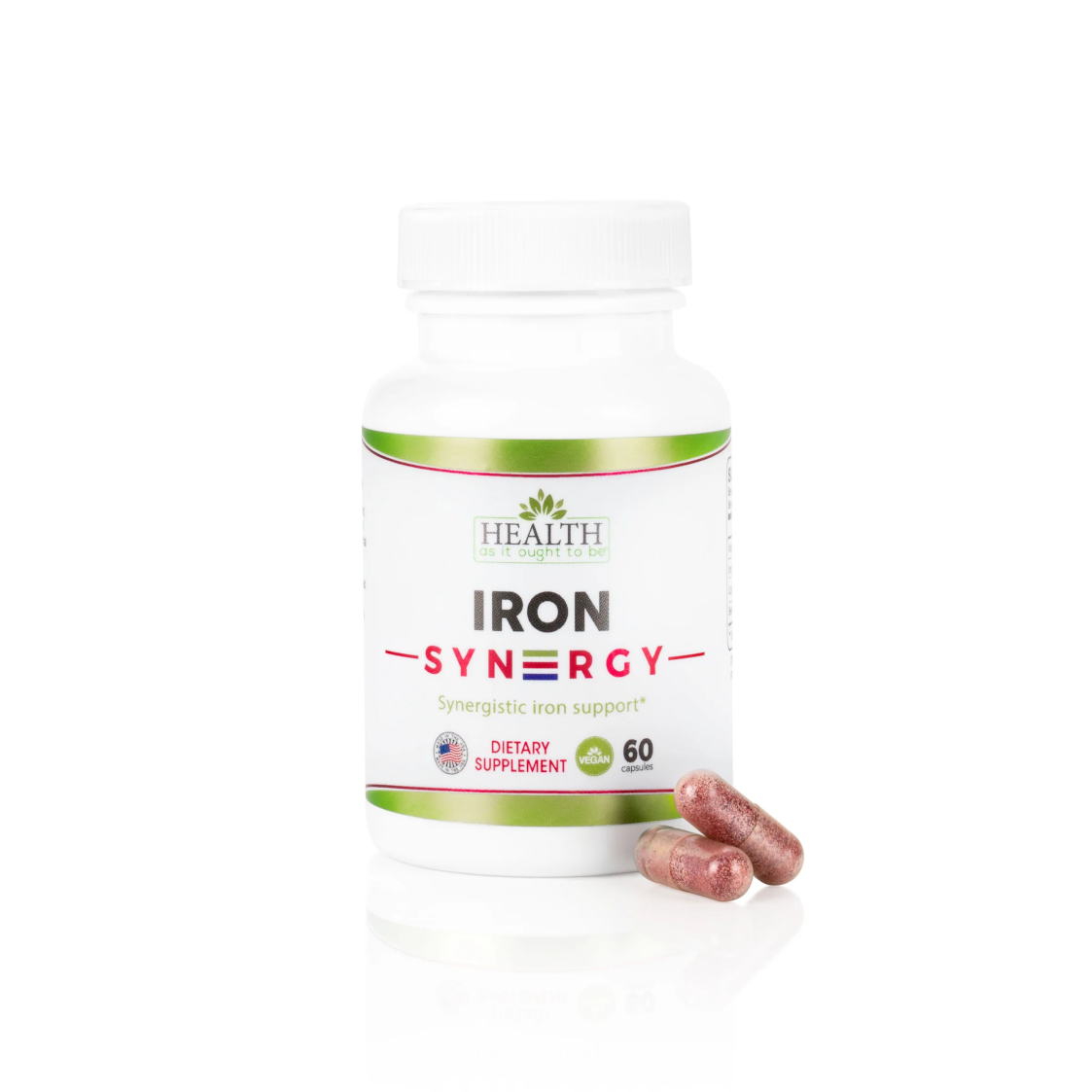
Our Brand New Supplement
I love it when we’re able to produce a new supplement.
As you can tell, we’re not much in the habit of producing new products every single month.
Part of the reason I keep our release schedule this slow is because we’re practitioners first and then supplement manufacturers way down the list.
The only reason we make a new supplement is because we see something in our visits with patients that triggers an “aha” moment where we realize the problem we’re seeing in our office could be remediated by a supplement.
That’s how we came to create every single product that we sell.
And this week we’re releasing our Iron Syn3rgy supplement.
Iron is one of those nutrients that is often overlooked.
Funny enough, it’s extremely important. Without iron, you would die, no ifs, ands, or buts. And yet, there are millions of people potentially walking around with iron levels that are out of balance.
Hence the release of our Iron Syn3rgy supplement.
First I’m going to cover what your body needs iron to do…
And then I’ll talk about the 4 magical (they’re not magical) ingredients in Iron Syn3rgy, and how they work together to support normal iron levels.
What Does Iron Even Do in the Human Body?
Iron is absolutely essential for health and wellness.
As you can probably guess, it is a mineral (or a metal) that plays a crucial role in the transportation of oxygen throughout your body.
Firstly iron is intimately involved in the production of hemoglobin, which is a protein in red blood cells that facilitates the movement of oxygen throughout the body via your blood.
Another way that iron helps regulate the oxygenation of your body is through the formation of myoglobin.
Myoglobin is another protein whose main role is to store oxygen in muscles.
Most people don’t have enough iron in their blood, and sometimes this is even true when they get enough of it in their diet.
Low iron levels are quite problematic.
The most common symptom of iron deficiency is anemia, a condition in which the body does not have enough red blood cells to carry oxygen to its tissues.
When a person is anemic they can feel overly fatigued, and weak, they may experience, shortness of breath, and have frequent headaches.
On top of anemia other things that an iron deficiency may produce are restless leg syndrome, impaired cognitive function, and a weakened immune system.
None of those sound too appealing I’d imagine.
Low levels of iron are the most common problem with iron, but sometimes people end up having too much iron in their bodies.
A condition called hemochromatosis causes the body to absorb too much iron from food, leading to a buildup in tissues and organs. Over time, this can cause liver damage and heart problems.
But most people don’t need to worry about high iron levels, though the way to know for sure is to get blood work done to watch your iron levels.
How to Maintain Healthy Iron Levels
As I always say, the absolute best way to ensure your nutrient levels are balanced is to prioritize a diet that is made of whole foods that come from sustainable sources.
When it comes to diet, eating foods that are rich in iron is an obvious move.
These foods would include red meat, poultry, seafood, and some legumes and leafy greens.
I’ve written extensively about the importance of animal-based eating over the past 18 months and believe that part of the reason this dietary path is so helpful is that it contains high levels of macronutrients like iron.
But of course, there are times when people still need help.
And that’s where Iron Syn3rgy comes into play.
I made this supplement with 4 ingredients that help support healthy iron levels.
1 - 10 mg Iron:
It makes sense that a supplement to help normalize iron levels is built around iron, which is the cornerstone mineral that is essential for the production of hemoglobin.
We give you 10mg of iron which is 56% of the RDA.
2 - 200 mg Beet Root Powder:
Beetroot powder is in our Circulation Syn3rgy supplement because of how it helps with blood flow (it is a vasodilator).
In addition to that, beetroot powder provides essential nutrients such as folate.
Folate aids in the formation of healthy red blood cells, which are crucial for maintaining good health.
3 - 3 mg Copper:
3mg of copper is 333% of your RDA, which I think is a reasonable amount to get considering the RDA is probably misguided, and most people are somewhat deficient in this mineral.
The reason to include copper is that it works hand in hand with iron to support the synthesis of hemoglobin and facilitate the conversion of iron into a usable form for the body.
Copper's inclusion ensures optimal iron utilization and recycling, thereby maximizing the benefits of increased iron levels.
4 - 200mg Vitamin C:
Finally, Iron Syn3rgy incorporates Vitamin C, which is a powerful antioxidant that is known for its ability to enhance iron absorption.
At 222% of the RDA, the inclusion of Vitamin C will help to enhance iron uptake.
This allows your body to make the most of the iron you consume, thereby ensuring that you receive the full benefits of our supplement.
The best part about these 4 ingredients is they all work together in a way to give you an iron level that leads to good health.
Now, I don’t think you should rely solely on Iron Syn3rgy to keep iron levels in the healthy range.
Diet, exercise, and sleep are more important, but this can help you remain healthy.
To get yours, go here.



